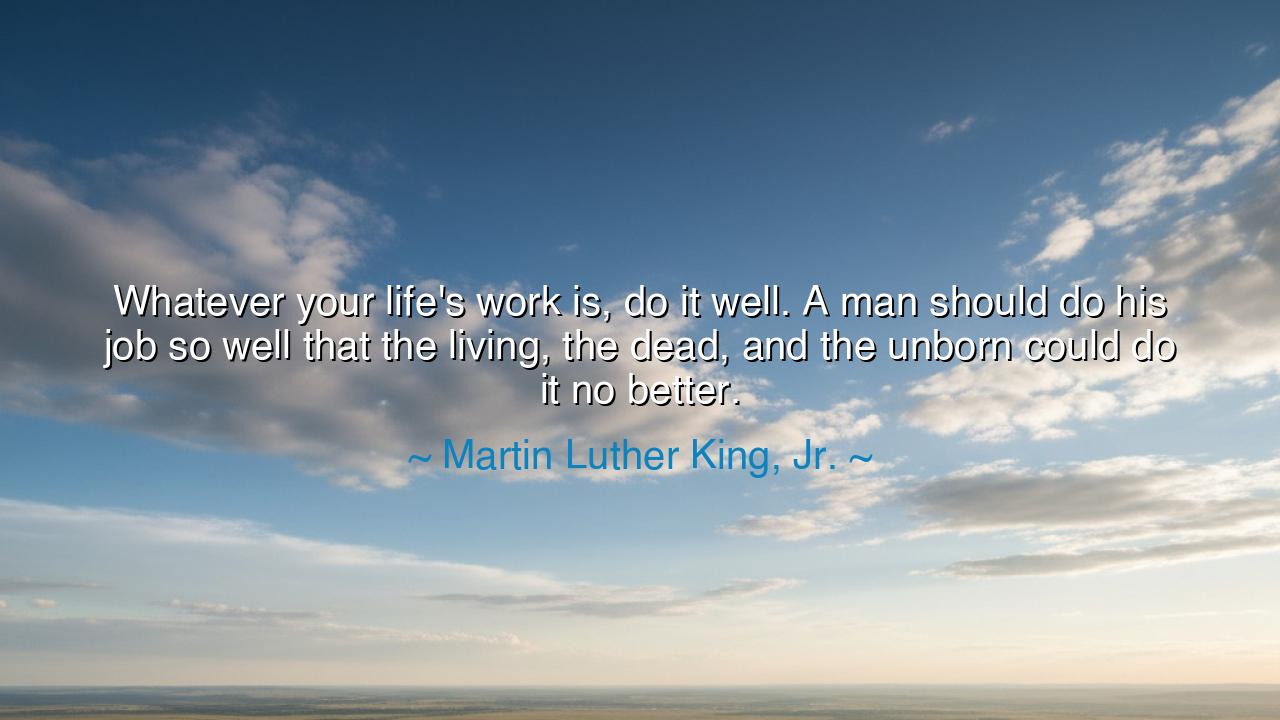
Whatever your life's work is, do it well. A man should do his job
Whatever your life's work is, do it well. A man should do his job so well that the living, the dead, and the unborn could do it no better.






Martin Luther King, Jr., prophet of justice and voice of a dream, declared with thunderous conviction: “Whatever your life’s work is, do it well. A man should do his job so well that the living, the dead, and the unborn could do it no better.” These words, though spoken in the cadence of his sermons, are not only about labor, but about the sacred duty of human existence. They are a call to excellence, to integrity, and to the pursuit of greatness in even the smallest of tasks, for every act well done becomes eternal.
The meaning of this teaching is that work is not merely survival, nor only a means to wealth, but a reflection of the soul. To do your work well—whether as teacher, builder, artist, farmer, or leader—is to honor life itself. Half-heartedness dishonors both the laborer and the labor, but excellence uplifts both. King reminds us that when we pour our whole being into our work, it becomes a testimony not only to ourselves, but to generations past and generations yet to come. Excellence is immortal.
The origin of these words is found in King’s belief that dignity is not tied to status, but to the spirit in which one works. He often told stories of the street sweeper who, though unnoticed by society, could sweep streets with such care and excellence that all the world would marvel. For King, this was not metaphor only: in an America divided by race and class, he sought to uplift every person by showing that worth is not measured by the scale of one’s work, but by the devotion with which it is done.
History provides us with luminous examples. Consider Michelangelo, who, when asked why he labored with such detail on the hidden corners of the Sistine Chapel, replied, “Because God will see.” He worked so well that centuries later the living still marvel, and the unborn yet to come will gaze in awe. This is King’s vision: that one’s work, done with heart and soul, transcends time, touching the dead, the living, and those yet unborn.
Even in the struggles of the oppressed, this truth has shone. The quilts sewn by enslaved women in America, stitched with care and coded with symbols of escape, were not only blankets for warmth—they became works of legacy, both beautiful and purposeful. Though their names were forgotten, their labor lives on, inspiring generations. They did their work so well that no one could have done it better. Their excellence, forged in hardship, became their eternal monument.
O children of tomorrow, hear this teaching: never despise the task before you, no matter how small it may seem. Whether you write words, lay stones, cook meals, or raise children—do it so well that history itself must pause to honor your labor. Do not wait for recognition, for true excellence needs no applause. It is enough that the work itself stands as proof of your devotion, and that heaven and earth bear witness.
The lesson is clear: greatness is not found in titles or riches, but in doing one’s duty with passion and care. In your own life, choose this path. Arrive not only to complete your work, but to perfect it. Respect your labor, and it will respect you in return. In every moment, ask yourself: “Am I doing this in such a way that none before me, none beside me, and none after me could do it better?” If you live with such a spirit, your legacy will outlast your years.
Thus let the words of Martin Luther King, Jr. echo like a charge across the generations: “Whatever your life’s work is, do it well.” Let this be your creed, and your life will become a beacon of excellence. The living will honor you, the dead will bless you, and the unborn will walk in the light of your example. For true greatness lies not in fame, but in faithful labor done with all the strength of the soul.






AAdministratorAdministrator
Welcome, honored guests. Please leave a comment, we will respond soon